Compared to past student-activists, who seemed militant when they made their demands at universities such as Cornell by commandeering administrative offices, Kelley thinks there is something of self-abuse in the readiness of today’s student-activists to use the language of trauma to justify change. He prefers that these students embrace James Baldwin’s brand of love in the name of radical politics. He writes, “To love all is to fight relentlessly to end exploitation and oppression everywhere, even on behalf of those who think they hate us.” Kelley presents as a contrasting model a seventies-era black lay collective, The Damned, using the example to make what reads as a sharp accusation against today’s students: “[The Damned] were not afraid to confront difficult contradictions” between trauma and love—implying that today’s students are.
Kelley and I both want the same thing for these students’ well-being. I in fact share the “stay tough” ethos that is the foundation of Kelley’s concerns; I was raised with it in a time and place in which there couldn’t be another way. But there is one aspect of the essay that leaves me unsure of my commitments.
Kelley overlooks the great deal of cultural distance between 2015 and 1970. The Damned really had little choice but to insulate themselves with the kind of love that Kelley and I both admire and believe in. Yet we should be mindful that their collective moniker—The Damned—was their way to signal trauma without pushing that language too far. The powerful stereotypes of black degeneration that had been reinvigorated by 1965’s Moynihan report preempted that strategy. But today just enough change has taken hold—and the social media technology exists—to facilitate these students’ desire to formulate and disseminate a message that makes sense for their social environment.
Though my own desire is for these students to adopt the stance, if not the machinery, of the famous photo of Malcolm X standing by his window holding a rifle—ready to defend himself by any means necessary—these students are in fact carrying on the work of Ida B. Wells, Anna Julia Cooper, James Baldwin, Audre Lorde, and the Black Panthers. We academics can talk about how the uses of trauma reify the neoliberal impetus to transform critical subjects into subjects ripe for therapeutic consumption. Sure. But it is inevitable that these students’ emotional and psychological needs will coincide to a degree with those of the present dominant culture. More to the point, we shouldn’t forget that the use of such language contains an element of strategy: in the case of “trauma,” student-protesters have co-opted a framework that orients many middle- and upper-class white Americans in a therapeutic head-space of careful listening, concern for well-being, and resolution-seeking. That this language has very different connotations for black American activists from prior generations may be less a cause for concern than a reminder that they are not the target audience. This is not to say that when our students invoke trauma, it is inappropriate to voice concern that they not victimize themselves. But we must trust that the world moves on and we are not always well positioned to properly assess the uses of new social practices. The elders looked askance at King for marching and stirring trouble, and our elders—many of whom are of King’s generation—give side-eye to the youth in Ferguson and Baltimore for destroying property. Now folks like Kelley and I are threatening to do the same to these students for insisting that their psychological needs and emotional vulnerabilities are salient.
Recently I had the privilege of breaking bread with a leader of Next Yale, a campus movement to pressure Yale’s administration to diversify our overwhelmingly white campus, especially in the faculty ranks. I inquired after the students’ well-being. She informed me they were very fatigued and that many would be taking the spring 2016 semester to study abroad. In a moment of revelation, she hypothesized that this year more than any other, black students would be looking to leave the country. Her suggestion made me immediately mindful of the deep historical tradition among black intellectuals and activists of leaving America out of a sense of self-preservation, to cope with trauma. No one typically accuses Baldwin or Richard Wright of “running away” or of giving too much weight to their emotional lives. Why, then, is it our impulse to level such critiques against today’s student-activists?








